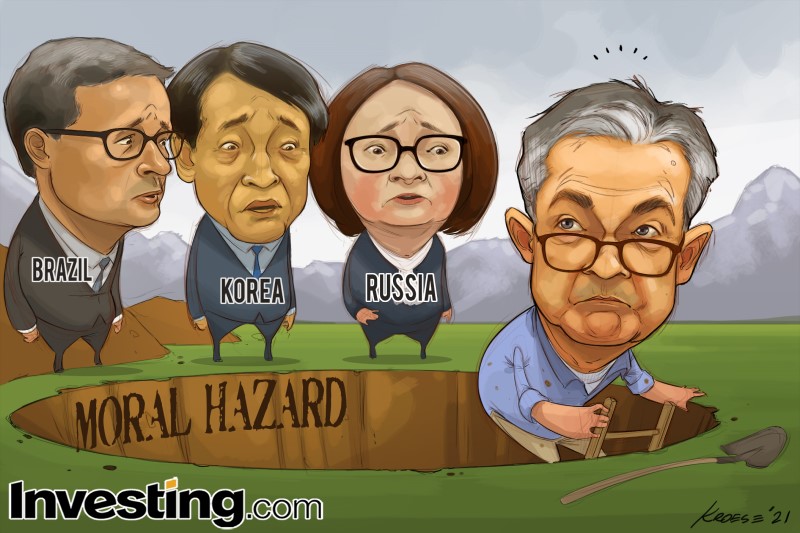By Geoffrey Smith
Investing.com -- The first rule of holes is famously that when you’re in one, stop digging. At Jackson Hole last week, Federal Reserve Chairman Jerome Powell - just about - managed to abide by the rule.
True, there was no clear announcement of a start to the ‘tapering’ of bond purchases that – 18 months after the start of the pandemic – are still running at a staggering $120 billion a month.
As Nordea’s Andreas Steno Larsen put it, the speech was so lacking in drama, or indeed anything new, that “It almost felt as if he was reading out aloud from the most recent FOMC meeting minutes.” (Delegates will be glad that, thanks to Covid 19, they didn’t actually have to take themselves all the way to Wyoming to hear it.)
But Powell’s assessment that “if the economy evolved broadly as anticipated, it could be appropriate to start reducing the pace of asset purchases this year,” was clear enough. The digging may not have stopped quite yet, but it’s about to.
If the presidents of the regional Federal Reserve banks had their way, tapering would already have started. St. Louis Fed President James Bullard has warned repeatedly that bond purchases may have been the right policy for last year, but they aren’t now.
“We’re doing more damage than helping with the asset purchases, because there is an incipient housing bubble in the U.S.,” Bullard told CNBC last week in a desperate attempt to steal his boss’s thunder. “We got into a lot of trouble in the mid-2000s by being too complacent about housing prices, so I think we want to be very careful on that this time around.”
Bullard will have felt vindicated by U.S. house price data for July that were published on Tuesday. The S&P/Case-Shiller composite house price index rose at a record high pace of 19.1% on the year, up from 17.1% in June and above expectations for 18.5%.
His counterpart at the Kansas City Fed, Esther George, meanwhile pointed out that the chance of the Delta variant of Covid-19 derailing the labor market recovery is much smaller now that vaccination is widespread and businesses have found ways to adapt to social distancing requirements.
“By and large, unlike what we have experienced last year, people have mechanisms to continue to interact with the economy,” she told Yahoo Finance. “That gives me some confidence…that we could continue to push through” with a reduction of asset purchases, she added.
The jobs market remains pivotal. After rising by nearly 1 million in July, U.S. employment is expected to have slowed in August as Delta took an increasing toll on public confidence. But economists still expect nonfarm payrolls to have grown by a very respectable 750,000, meaning that nearly half of the jobs lost in 2020 will have been replaced.
“Early indications are that the Delta variant won’t throw a wrench into the labor market, and we expect strong performance to continue as summer turns to fall,” said Eric Winograd, a senior economist with AllianceBernstein (NYSE:AB) in a blog post.
Winograd says it will take “especially strong August numbers” to trigger a tapering already at the Fed’s next policy meeting on September 22nd, but still expects the process to start this year.
However, as after the Great Financial Crisis, the task of preparing global markets for a turn in the U.S. monetary policy cycle is a daunting one. One of the reasons that Powell and the D.C.-based board of governors tend to be more dovish than their regional brethren is that they are more attuned to the global economy’s demand for dollars and aware that a new cycle risks triggering global market instability and stunting the economic recovery.
Emerging markets in particular are at risk if the Fed lets U.S. inflation get out of hand and then has to race to get back ahead of the curve. Already, net investor flows to emerging markets have turned negative in anticipation of the usual volatility triggered by Fed tightening cycles, says Robin Brooks, chief economist with the Institute of International Finance.
“We are concerned about a scenario where you would have inflation come up much higher than expected, and that would require a much quicker normalization of monetary policy in the U.S.,” International Monetary Fund chief economist Gita Gopinath told the Financial Times this week.
In happier times, tighter policy from the Fed is often a sign of a strong global economy, as well as a strong U.S. one. But this is not a normal economic or financial cycle. The pandemic has forced unpredictable responses from central banks across the world. In the last month alone, a single case of Covid-19 forced the Reserve Bank of New Zealand to postpone a rate hike that was all but nailed on, while a week later, South Korea surprised markets by raising its key rate to deflate a raging house price boom. Volatility is almost certain to increase as the Fed withdraws the monetary comfort blanket.
Or, as Alliance’s Winograd says: “We can’t truly be confident that the market will take the taper in stride until the taper actually starts.”
